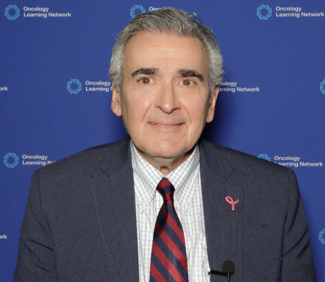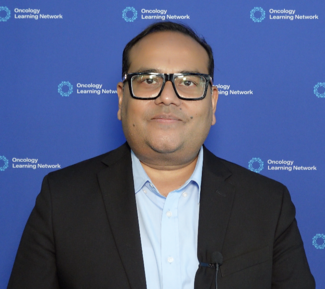Sequencing Antibody-Drug Conjugates Among Patients With Breast Cancer
Kelly McCann, MD, PhD, University of California, Los Angeles, discusses the sequencing of antibody-drug conjugates for patients with breast cancer.
At the Great Debates in Solid Tumors meeting in Miami, Florida, Dr McCann argued for the sequencing of antibody-drug conjugates for patients of breast cancer, debating Tiffany Traina, MD, Memorial Sloan Kettering, New York City, New York, who argued that only the first ADC had benefit among this patient population.
Transcript:
Hi, I am Kelly McCann. I'm a breast medical oncologist at UCLA and I'm here at Great Debates in Solid Tumors, in Miami.
Today at Great Debates Tiffany Traina and I talked about ADC after ADC in breast cancer. Our ADC drugs right now, for hormone receptor-positive/HER2-negative breast cancer are sacituzumab govitecan, trastuzumab deruxtecan, and datopotamab deruxtecan. All 3 of these therapies have been approved versus chemotherapy, and in the clinical trials to date, they've been more efficacious than chemotherapies.
Part of the debate was looking at ADC after ADC, should we be doing that strategy? Some of the things that we got into were, do we do a sandwich approach: ADC, different chemo, ADC. After that, there's a lot of nuances. One of them being that ADC after ADC, there can be cross-resistance for drugs that have a similar payload. There's also probably a lot of mechanisms that have to do with antigen expression or even the linker. We need prospective trials in order to look at those mechanisms of resistance going forward. And there are several that are in play right now.
There are a number of reasons that could be why an ADC medication is better than a cytotoxic chemo in terms of efficacy. One could be that they can be given for a prolonged period of time. You don't have the types of side effects that you would get with a prolonged period of exposure to taxanes and anthracyclines, both of which are some of the best drugs that we have for breast cancer. Now, another is that these are in your system, the patient's system for a prolonged period of time. That ADC has an antibody attached with the chemotherapy, and so just having that protein with the molecule, it tends to hang out in the system. And so you have to warn patients about that in advance, that they're going to have prolonged side effects.
Side effects with some of these medications have been difficult to predict. They've all had different side effects, even though the 3 approved for hormone receptor-positive all have a TOP1 inhibitor payload, and so that's very important. With trastuzumab deruxtecan, there is the 10% to 15% risk of pneumonitis, there is nausea and there's fatigue. Sacituzumab govitecan, there's alopecia, there's myelosuppression. And then with datopotamab deruxtecan, there's stomatitis and ocular toxicities. So, even though these are all ADCs that have a payload that is similar to irinotecan, which is notorious for diarrhea, they have very different side effects.
One of the questions that came up at the debate was, which ADC do you use preferentially for triple negative versus hormone receptor-positive, HER2-negative metastatic cancer. I think both Tiffany Traina and I agreed that for triple negative metastatic breast cancer, we use sacituzumab govitecan as a first-line therapy in almost all of our patients, and that's because there's just so much more data for sacituzumab govitecan compared to trastuzumab deruxtecan.
Recently at ASCO the ASCENT-04 trial reported out, this was metastatic triple-negative breast cancer that is PD-L1–positive treated in the first-line metastatic setting with sacituzumab govitecan plus pembrolizumab. That was a positive trial, and so this means that that combination of an ADC plus an immune checkpoint inhibitor can move into the first-line setting for triple negative patients.
DESTINY-Breast06 was a clinical trial in which trastuzumab deruxtecan versus treatment of physician’s choice was evaluated in patients as their first chemo for hormone receptor-positive, HER2-negative metastatic breast cancer after they developed endocrine therapy-refractory disease. About 60% of the patients on treatment of physician's choice received capecitabine. There's a couple of interesting caveats about that. One is that even though this was a positive trial, looking at trastuzumab deruxtecan as more efficacious, a lot of my patients are still choosing, when you go down the menu of trastuzumab deruxtecan versus capecitabine versus a taxane, even though there's a better efficacy for trastuzumab deruxtecan, a lot of my patients are still choosing capecitabine. Capecitabine is an oral drug with a great side effect profile. No hair loss is still preferred by a lot of patients, because patients are choosing their medications based on a lot of different things besides just a median progression-free survival. And the most important of those for most of my patients has been quality of life. Even though trastuzumab deruxtecan can be used as a first line chemotherapy, it's important to have that conversation with patients to see whether or not they would prefer something els. Because their priorities and your priorities might be slightly different.
In my clinical practice of metastatic breast cancer, I do discuss the options of not only the ADCs but other types of cytotoxic therapies with my patients, and we go through the side effect profiles and the efficacy analyses, and it's a shared decision-making between my patients and me so that we ultimately choose the best therapy for that patient.
In my clinical practice, for my patients who are on an ADC, I usually do a different type of cytotoxic chemotherapy before I'm going to go to that next ADC, because we know that there's resistance that can develop with ADC and then following a second ADC directly afterwards in the triple negative space and the hormone receptor-positive, HER2-negative space. And that's because at least on one level, the payload is very similar, but there could also be differences in antigens that affect that as well. Of course, we know ADC after ADC is a viable strategy because we've all seen the data for DESTINY-Breast01, which was trastuzumab deruxtecan after trastuzumab emtansine, and we know that that's a viable strategy.
We do need a lot more variability in terms of not only antigens, but also payloads. There are a lot of clinical trials looking at that now. Sometimes in those clinical trials, the toxicities have been unpredictable on some level: eye toxicities when you didn't expect it, the pneumonitis rate with trastuzumab deruxtecan, for example. And so it's very important that in our clinical trials, we're very careful to really suss out some of these and then to try and prevent those in the future.
















